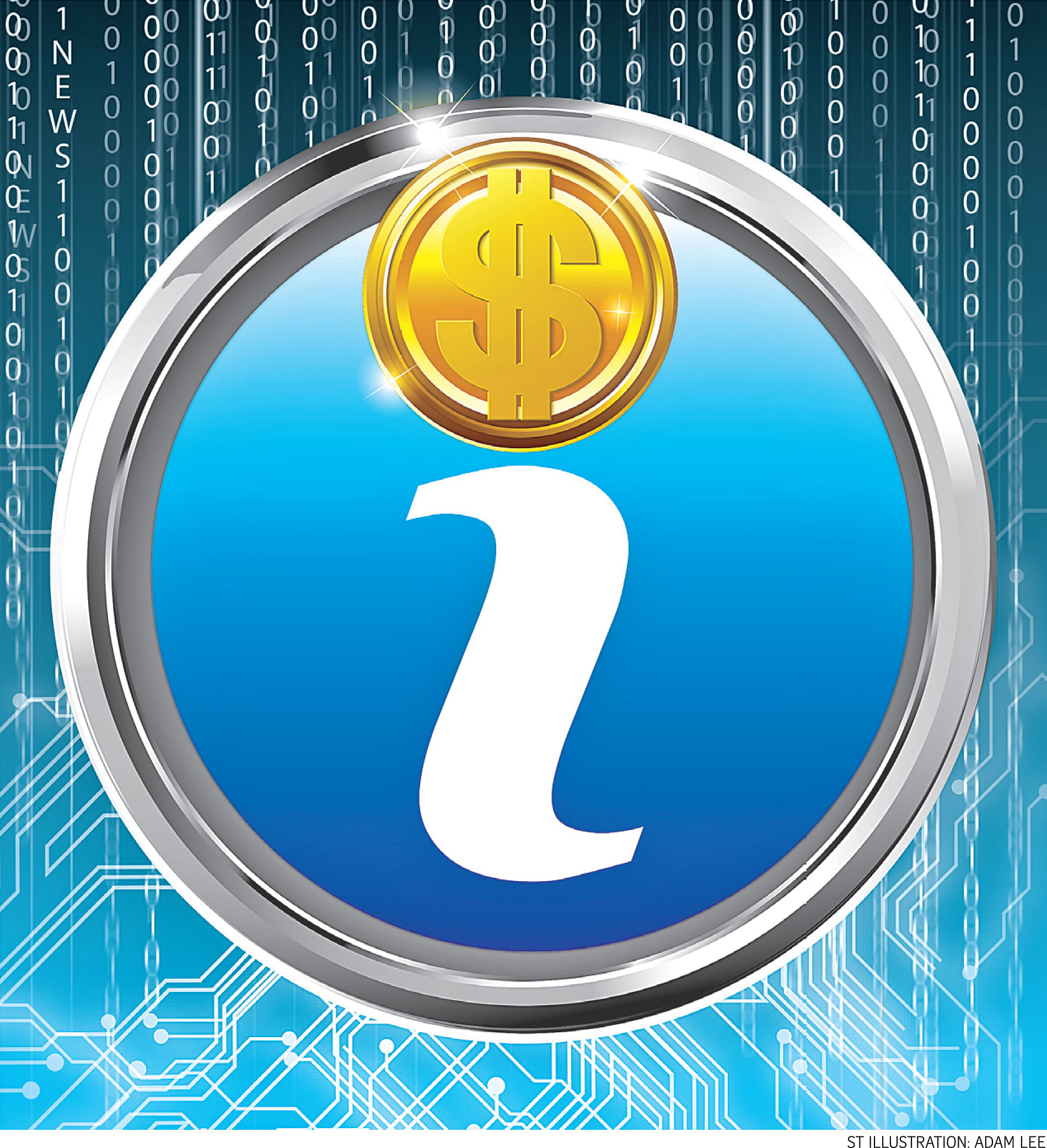I grew up with Chinese immigrant parents whose life ethos manifested the notion that you work hard for what you need, because nothing is free in this world.
In my adult life, I still tend to look a gift horse in the mouth and am suspicious of freebies and too generous offers. If a deal seems too good to be true, it probably is just that. Stay away.
But like many other modern citizens of a rich, industrialised, interconnected world, I've been seduced by the flood of freebies I get on the Internet. Information is free. Entertainment in the form of countless articles and videos is free. Search is free.
Google puts the wealth of centuries of research and knowledge literally at my fingertips, condensed into bite-sized, graphical and relevant information. I expect Google to read my mind when I key in a few words and to know precisely what about "big tech safe harbour" or "singlit poetry wrestling" I need to know to edit or write an article.
I expect its algorithms and bots to trawl through millions of Web pages and sites to deliver the handful of pithy, relevant articles I need to read to get up to speed on a subject. I expect the information delivered in three seconds, and I expect it free.
But as some have warned, and many of the rest of us are just discovering, nothing is really free. Not even information or search results. We use Google to search for information we want online. We use Facebook, Twitter and Instagram to connect with friends and share photos and updates. It's all free.
But when something is free, often someone, somewhere, is paying the price. And in a roundabout way, the price often comes back to us.
Let's talk about search results. Who is paying the price of that free search?
We all are - by handing over our browsing history and personal information. Google tracks each site you visit; it may also have your contacts and your credit card details. Each of us becomes a potential customer for an ad that Google sells to advertisers.
If a shampoo-seller wants to advertise a hair product for women who want more lustrous hair, Google might notice that I'd been searching "what to do with thinning hair" or "how to style my hair so it looks fuller" and serve me up as a customer for that shampoo-seller.
That shampoo ad might pop up the next time I open my browser to search for something unrelated, like "best omakase meal in Singapore under $50". (That search would of course be noted and Google would be serving me restaurant ads next.)
Internet users are in effect handing over their personal information and preferences, and allowing sites such as Google and Facebook to monetise their Internet-browsing habits.
How about the information that goes into those search results?
Who's spending time researching, and writing, about "big tech safe harbour" laws, for example? Or "income inequality and impact on economic growth"? Or "when is the next season of Billions coming out"?
Who are the ones spending money to produce videos, graphics and stories on, say, the Las Vegas shooting, the Catalonia independence vote, or even the reserved presidential election?
One big group of people involved in producing high-quality, credible information are journalists in newsrooms worldwide. Getting smart, energetic, ambitious people to devote their careers to gathering news and interpreting it is expensive. Media organisations know it and have traditionally expected people to pay for that information produced.
The Internet has broken that business model by serving up a lot of news and information for free.
The result has affected the financial bottom line of mainstream media organisations (including Singapore Press Holdings, which publishes this newspaper) which now find their traditional revenue streams of subscriptions and print-based advertising hit. Predictably, some media companies have scaled down on journalism resources; just as predictably, over time, the information vacuum left behind has become filled by click-bait news sites while the proportion of in-depth, verifiable, credible information available in the digiverse has declined.
This explains why the issue of "fake news" or false information masquerading as news has become so prevalent in the last year. Bad information is driving out good.
Things have got to such a state that even Google and Facebook, which benefited from serving up free news for their users, are now coming to see that there is merit to helping media organisations stay viable to produce good news and information.
Otherwise, the quality of Google's own search results will deteriorate, if they are populated by public relations spin from commercial companies and fake news content from websites created just to channel traffic there for advertising revenue.
Just last week, Google changed a key policy towards news publishers. It ended its decade-old "first click free" policy that makes news publishers give away stories for free each day, in exchange for high search rankings. Those that don't want to give away their content free and who keep stories behind a paywall, as the Wall Street Journal did, would rank low in Google search results. When WSJ bowed out of "first click free" this year, its traffic from Google fell 38 per cent and year-on-year referrals from Google News were down 89 per cent in August.
Google's vice-president of news Richard Gingras last week said the tech company will go for "a flexible sampling model where publishers will decide how many, if any, free articles they want to provide to potential subscribers based on their own business strategies".
Google went one step further, saying it will help news publishers convert casual news readers into subscribers.
A New York Times article said of the Google move: "One of the company's goals, Mr Gingras said, is to help 'take the friction out of the purchase process' by using its own technological capabilities, as well as the information it has on users - including e-mail address and credit cards - to make subscribing simpler."
Mr Gingras said Google expected to begin rolling out its suite of subscription support services in the first half of next year. "We're not suggesting this is a magic bullet for growing subscription revenue," he said. "We'll continue to collaborate - this is a journey."
Facebook has also announced plans to help publishers gain paid subscriptions.
The move to recognise that news has to be paid for has been welcomed by publishers worldwide, especially as it comes from the two big tech behemoths that together gobble up nearly all the growth in digital ad revenue each year.
At the heart of the change in direction is a growing recognition that there is no such thing as free news or information. Free comes at a cost: to consumers, who surrender their private information and preferences, and pay in the currency of their attention; to media companies and journalists whose hard work is devalued when it is forced to be made free; and ultimately, to all of us who use the Internet, as the cybersphere becomes awash in untrustworthy information.
Meanwhile, the platform companies such as Google and Facebook, which have access to all the data analytics, will of course continue to monetise their information about us.
In the arc of things, the pendulum that says information wants to be free is slowly swinging back to a more median position where information has a price, and where we all decide collectively we are prepared to pay a reasonable price for it.
Hence, rampant digital piracy is already giving way to millions of paid subscriptions to streaming services. Already, many people are finding that it's worth their while to pay about $10 a month to subscribe to a library of music or TV shows or movies they can watch anytime rather than to engage in illegal downloading of such content and risk falling afoul of the law, and risk their computers being infected with malware and, for some perhaps, risk living with the moral stigma of becoming a thief who steals from the content producer.
I hope more of the rest of us ordinary consumers of news and information realise that there is a cost to things that are free.
As a journalist who writes for a living, I am aware that my argument can be seen as self-serving, and indeed it is. But it is no less in the public interest. As an increasing number of commentators have argued, quality journalism is a public good that is for building stable democracies and as a watchdog on power.
For the Singapore media, the challenge is for us to step up, going beyond our traditional consensus-building role, to provide more incisive journalism that does not duck difficult issues.
Otherwise, without quality information, what might be the long-term effect of mindlessly imbibing low-grade content and digital ads doled out to us?
In a brilliant article in the Washington Post, reprinted in last week's Sunday Times, Franklin Foer, the author of World Without Mind: The Existential Threat Of Big Tech, warned about succumbing to the lure of Big Tech.
"We've spent too long marvelling. The time has come to consider the consequences of these monopolies, to reassert our role in determining the human path. Once we cross certain thresholds - once we remake institutions such as media and publishing, once we abandon privacy - there's no turning back, no restoring our lost individuality."
He drew a parallel with the growth of convenience and processed foods about 50 years ago which delighted a generation that was freed from onerous cooking. It took decades to understand the price paid for convenience and efficiency.
"Yes, processed foods were feats of engineering, but they were engineered to make us fat. Their delectable taste required huge amounts of sodium and sizeable stockpiles of sugar, which happened to reset our palates and made it harder to sate hunger.
"A whole new system of industrial farming emerged, with penny-conscious conglomerates cramming chickens into faeces-covered pens and stuffing them with antibiotics.
"By the time we came to understand the consequences of our revised patterns of consumption, the damage had been done to our waistlines, longevity, souls and planet."
He added: "Something like the mid-century food revolution is now reordering the production and consumption of knowledge. Our intellectual habits are being scrambled by the dominant companies."
His key thesis is that "as with the food giants, the tech behemoths have given rise to a new science that aims to construct products that pander to their consumers".
In traditional media, high-minded and "snobbish" elite editors decide on what's news to shape public opinion for the better, as Foer noted. Today's infosphere is dominated by Silicon Valley executives who use science, data and algorithms to, as he put it, "exploit the public's worst tendencies, its tribalism and paranoia" and target them to serve up content and advertising.
He added: "The proliferation of falsehoods and conspiracies through social media, the dissipation of our common basis for fact, is creating conditions ripe for authoritarianism."
Even if you don't agree with his political worldview and warning of armageddon, think about the core of his warning: that the information we are all getting for free today has a price tag - and we will pay one day.
Unless we take steps to remedy the situation today.


